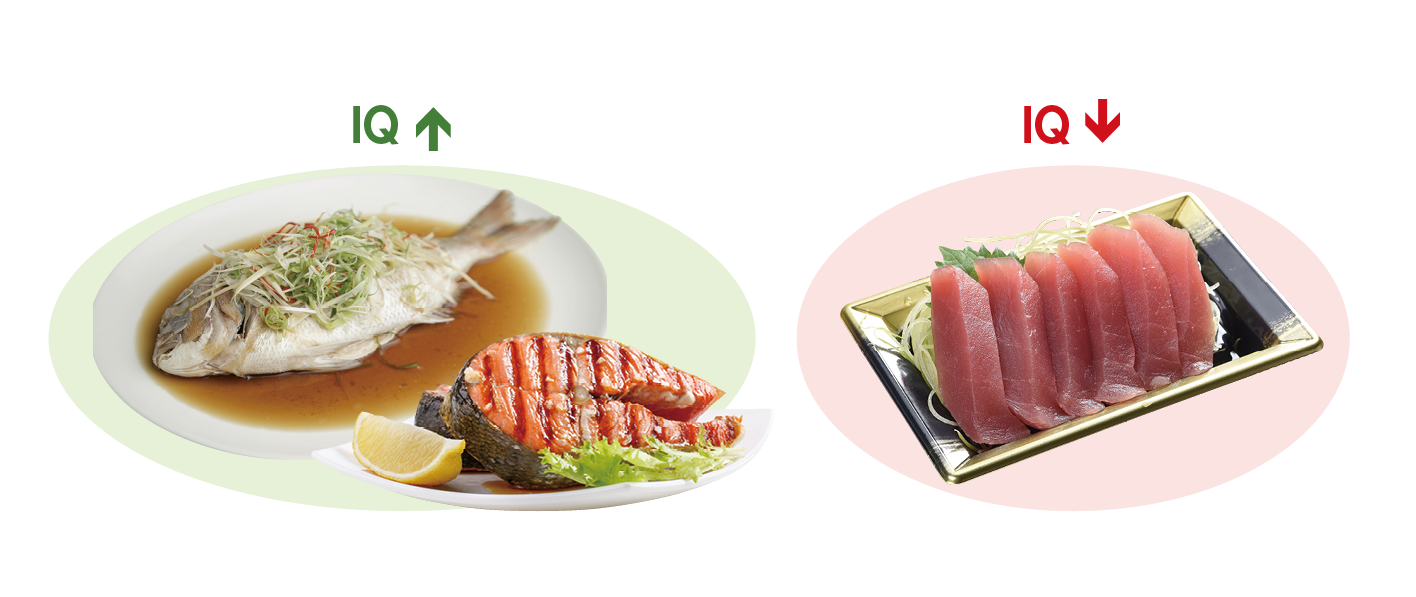
Food Safety Focus (154th Issue, May 2019) – Incident in Focus
Balancing the Risks of Methylmercury and the Benefits of DHA and EPA from Fish
Reported by Ms. Melva CHEN, Scientific Officer,
Risk Communication Section,
Centre for Food Safety
A recent report published by a consumer organisation about high levels of methylmercury detected in some locally-sourced tuna sashimi has raised concern of some consumers about eating fish. In fact, over the past decade, the Centre for Food Safety (CFS) has conducted several relevant studies and formulated advice on fish consumption. This article will discuss the risks and benefits of eating fish to help consumers make informed choices.

Pregnant women eating a variety of fish in moderation may boost their children's intelligence quotient (IQ). Contrarily, those eating certain predatory fish such as tuna too often may decrease their children's IQ.
Methylmercury affects the nervous system, particularly the developing brain of foeti and infants. While the levels of methylmercury in most fish are low, there are many essential nutrients in fish such as omega-3 fatty acids, docosahexaenoic acid (DHA) and eicosapentaenoic acid (EPA) which are beneficial to brain development.
How Does Fish Contain Methylmercury?
Mercury is a heavy metal that occurs naturally and being introduced into the environment from industrial waste. Mercury exists in different forms. Microorganisms in the water convert mercury into the more toxic methylmercury which is readily taken up by living organisms in the water and accumulates up the food chain. Thus, predatory fish usually contain higher levels of methylmercury.
Benefits Outweigh the Risks by Consuming a Variety of Fish
According to the World Health Organization (WHO), the effects on children's intelligence quotient (IQ) resulting from the intake of methylmercury and DHA and EPA from fish by their mothers during pregnancy could be quantified. To measure the effects, the levels of methylmercury and DHA and EPA in different types of fish were analysed. Based on the WHO's model, a risk-benefit analysis was conducted by the CFS using the consumption data of fish of women of childbearing age (20-49 years old). The results revealed that there could be net gain of children's IQ (up to 5.6 points) from mothers of average consumption group who ate 450g (~12 taels) per week of those commonly available fish in markets.
However, the risk-benefit analysis also found that pregnant women who ate certain types of predatory fish such as tuna too often might cause a decrease in IQ points of their children. The WHO stated that losses in few IQ points may go unnoticed in an individual, but it can cause an important shift in intellectual capacity at the population level. In Hong Kong, about 11% of women of childbearing age had methylmercury level exceeding the health-based guidance value. Therefore, moderate consumption of a variety of fish and avoid choosing large predatory fish and fish which may contain high levels of methylmercury in diet during pregnancy are recommended.
Protecting the Public from Exposure to Excessive Methylmercury
Locally, routine surveillance of mercury in food is in place. Over the past three years, the CFS has taken 2700 aquatic products for testing. Nine samples were found to be exceeding the legal limit, with follow-up actions taken accordingly.
The Food Adulteration (Metallic Contamination) (Amendment) Regulation (Cap. 132V) will come into effect in phases from November 2019. The maximum limit for methylmercury in fish will be 0.5 mg/kg, a level which is more stringent than the Codex standard of 1.2 mg/kg methylmercury for tuna. This prudent decision was made by taking the relatively high exposure to methylmercury in local women of childbearing age into account to enhance protection of the healthy development of foeti. In parallel, the CFS has issued an "Advice for Pregnant Women, Women Planning Pregnancy and Young Children on Fish Consumption".
Key Points to Note:
- Methylmercury is a more toxic form of mercury affecting the nervous system, particularly the developing brain of foeti and infants.
- Pregnant women eating a variety of commonly available fish and fish products in moderation may boost their children's IQ. Contrarily, those eating large predatory fish or fish which contain high levels of methylmercury too often may decrease their children's IQ.
- Consumers should avoid excessive exposure to methylmercury.
Advice to Consumers
- Pregnant women, women planning for pregnancy and young children should avoid eating large predatory fish and fish which may contain high levels of methylmercury.
- Fish contain many essential nutrients, such as omega-3 fatty acids and high quality proteins. Moderate consumption of a variety of fish is recommended for a balanced diet.
- Maintain a balanced and varied diet so as to avoid excessive exposure to metallic contaminants from a limited range of food items.
Advice to the Trade
- Obtain food supplies from reliable sources.
- Maintain proper records to enable source tracing when required.
- Inform customers of the type of fish that is sold, served, or used in fish products.

